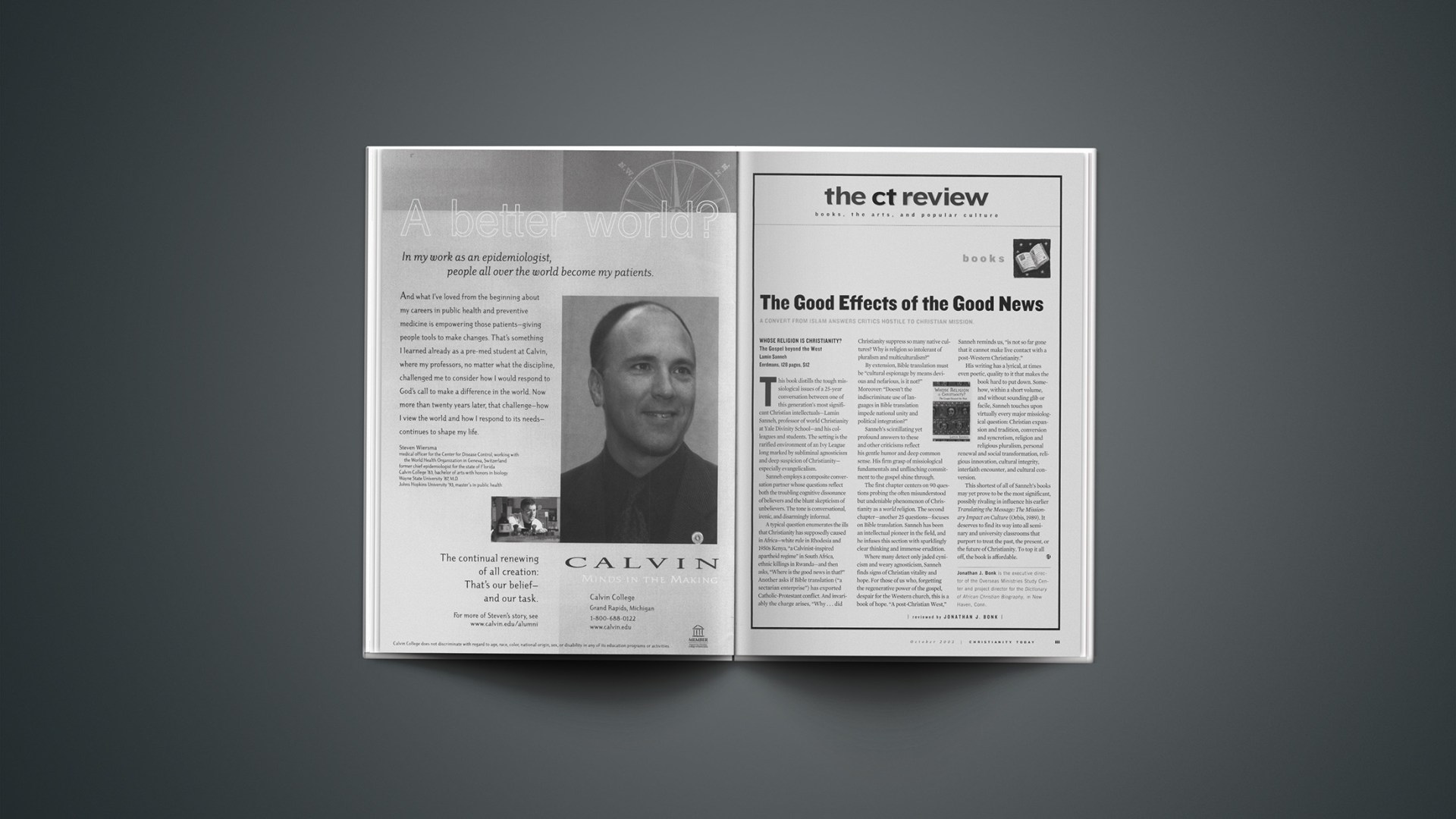 |
This book distills the tough missiological issues of a 25-year conversation between one of this generation’s most significant Christian intellectuals—Lamin Sanneh, professor of world Christianity at Yale Divinity School—and his colleagues and students. The setting is the rarified environment of an Ivy League long marked by subliminal agnosticism and deep suspicion of Christianity—especially evangelicalism.
Sanneh employs a composite conversation partner whose questions reflect both the troubling cognitive dissonance of believers and the blunt skepticism of unbelievers. The tone is conversational, irenic, and disarmingly informal.
A typical question enumerates the ills that Christianity has supposedly caused in Africa—white rule in Rhodesia and 1950s Kenya, “a Calvinist-inspired apartheid regime” in South Africa, ethnic killings in Rwanda—and then asks, “Where is the good news in that?” Another asks if Bible translation (“a sectarian enterprise”) has exported Catholic-Protestant conflict. And invariably the charge arises, “Why … did Christianity suppress so many native cultures? Why is religion so intolerant of pluralism and multiculturalism?”
By extension, Bible translation must be “cultural espionage by means devious and nefarious, is it not?” Moreover: “Doesn’t the indiscriminate use of languages in Bible translation impede national unity and political integration?”
Sanneh’s scintillating yet profound answers to these and other criticisms reflect his gentle humor and deep common sense. His firm grasp of missiological fundamentals and unflinching commitment to the gospel shine through.
The first chapter centers on 90 questions probing the often misunderstood but undeniable phenomenon of Christianity as a world religion. The second chapter—another 25 questions—focuses on Bible translation. Sanneh has been an intellectual pioneer in the field, and he infuses this section with sparklingly clear thinking and immense erudition.
Where many detect only jaded cynicism and weary agnosticism, Sanneh finds signs of Christian vitality and hope. For those of us who, forgetting the regenerative power of the gospel, despair for the Western church, this is a book of hope. “A post-Christian West,” Sanneh reminds us, “is not so far gone that it cannot make live contact with a post-Western Christianity.”
His writing has a lyrical, at times even poetic, quality to it that makes the book hard to put down. Somehow, within a short volume, and without sounding glib or facile, Sanneh touches upon virtually every major missiological question: Christian expansion and tradition, conversion and syncretism, religion and religious pluralism, personal renewal and social transformation, religious innovation, cultural integrity, interfaith encounter, and cultural conversion.
This shortest of all of Sanneh’s books may yet prove to be the most significant, possibly rivaling in influence his earlier Translating the Message: The Missionary Impact on Culture (Orbis, 1989). It deserves to find its way into all seminary and university classrooms that purport to treat the past, the present, or the future of Christianity. To top it all off, the book is affordable.
Jonathan J. Bonk is the executive director of the Overseas Ministries Study Center, editor of the International Bulletin of Missionary Research, and project director for the Dictionary of African Christian Biography, in New Haven, Conn.
Copyright © 2003 Christianity Today. Click for reprint information.
Related Elsewhere
Whose Religion is Christianity is available from ChristianBook.com and other book retailers.
See also Bonk’s interview of Sanneh.
At the Ethics and Public Policy Center in May, Sanneh addressed journalists, scholars, and church leaders on “Evangelicals, Islam, and Humanitarian Aid.”
Sanneh’s page at the Yale Divinity School web site offers his curriculum vitae.










